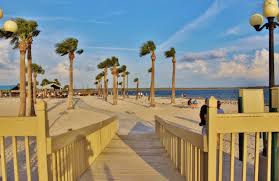At the regularly scheduled Board of County Commissioners (BOCC) meeting Tuesday, April 28, 2020 the board voted to extend the current state of emergency for an additional seven days as is required by Florida law. They also voted to reopen parks and beach areas, such as Alfred McKethan Park and Pine Island. Pine Island’s beach has been closed, however remained open to launch watercraft. Both votes were unanimous.
County Administrator Jeff Rogers presented several operational changes and restrictions on the reopening of the parks, however most were removed in an amended motion to only follow CDC guidelines and any other executive orders given by Governor DeSantis.
Effective April 29, 2020, social distancing guidelines will remain intact and park and beach visitors are encouraged to read and follow posted signage at each park for restricted activities.
The discussion surrounding the decision to move forward with the reopening of the parks and beaches was largely about individual constitutional rights, recovering the economy, and restoring normalcy while preserving health and safety, with possibly some “new normals.”
Commissioner Steve Champion opposed the additional restrictions above any orders by the Governor. “Is it the government’s job to restrict free people? I say ‘no’.”
Restricting the number of people on Pine Island or at Alfred McKethan Park was of concern to Commissioner Wayne Dukes, for logistics and counting purposes. Commissioner John Allocco set the scene for individuals and families making their own choices, “Four people come in a car, way closer than six feet (apart). They’re not going to sit six feet apart on the beach once they’ve been sitting in a car, elbow to elbow. I think the public is going to figure this out for themselves.” Jeff Holcomb also concurred with these statements.
Chairman John Mitten added a different viewpoint, adding, “I appreciate the different dynamics here, and it is political. And the problem with politics is it tends to cloud and go to extremes sometimes, for positioning. I appreciate the fact that we want to provide opportunities for people to do everything as long as they follow CDC guidelines. That’s like saying, ‘Listen, we’re not going to put a speed limit you all just drive safe.’ At some point does government have a responsibility to provide limits so that people can be protected?”
Mitten’s statement drew particular contention from Champion, who said, “You don’t have a say in what I do. None of us do. You don’t have a say in my family. The Constitution gave me that right — to be free and govern myself. That’s the bottom line.” Speaking about the current restrictions in place, Champion said, “Our rights are being eroded.”
Champion went on to say that he was in agreement with any future order from Governor DeSantis, and was in agreement with CDC guidelines.
“The last thing I want to do is get in the way of people getting back to work,” Mitten said. “I want the government to get out of the way. At the same time, do you do that all at once?
All commissioners agreed that the current state of emergency does in fact limit individual rights, but most infractions are not addressed by law enforcement. Commissioner John Allocco’s concern is that adding additional rules such as prohibiting kids on playgrounds or playing basketball could put law enforcement and park personnel in awkward situations.
While the BOCC meeting was taking place, Governor Ron DeSantis held a press conference at the White House, accompanied by President Trump. DeSantis began by addressing the topic of nursing homes and other long-term care facilities, and how Florida has been proactive in testing patients and staff in these facilities, as well as measures taken to ensure proper personal protective equipment (PPE) is available to staff.
DeSantis reported that while the outbreaks nationally in nursing homes have been alarming, the rate of fatal infections in Florida’s facilities is at 1.2%. New Jersey is reported to have a fatality rate of 28.3%
“Our ability to test now exceeds the current demand,” DeSantis said, describing the widening of testing criteria to include those who may not have any symptoms.
DeSantis said, “For Florida, going from where we are to Phase 1 is not a very big leap. I think it will be a very small step for us, but we’re going to approach it in a very measured, thoughtful and data-driven way, and I think that’s what folks throughout the state are looking for.”
DeSantis’ official order to begin Florida’s Phase One reopening is expected on Thursday, April 30, 2020.

